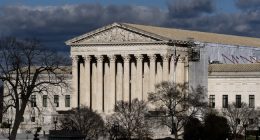- Commonwealth Bank says rate cuts looking unlikely in 2024
- But it said relief was still possible by Christmas if inflation fell
The Commonwealth Bank is now declaring rate cuts are unlikely before Christmas unless unemployment rises faster than predicted.
Australia’s biggest home lender has suggested the Reserve Bank won’t be cutting rates until February, instead of November, after the RBA’s August meeting minutes were released emphasising no relief in 2024.
Gareth Aird, the Commonwealth Bank’s head of Australian economics, said borrowers would only get relief if inflation fell faster than expected as unemployment climbed to levels higher than officially forecast.
‘The August board minutes indicate that if the economic data evolves in line with the RBA’s latest forecasts the cash rate will likely stay on hold for an extended period (i.e. until at least February 2025),’ he said.
RBA Governor Michele Bullock a fortnight ago declared financial markets were wrong to predict rate cuts in November and December.
But the minutes of that August 5 and 6 meeting, released on Tuesday, emphasised financial markets were dreaming if they thought a rate cut would occur this year.
‘That said, members noted that the forecasts were uncertain,’ it said.
‘Importantly, they were also based on a conditioning assumption, derived from market expectations, that the cash rate would be lowered several times in the coming year, beginning later in 2024.

The Commonwealth Bank is now declaring rate cuts won’t be happening before Christmas
‘Based on what they knew at the time of the meeting, members agreed that monetary policy would need to be tighter than this implied path in order to bring inflation sustainably back to target within a reasonable timeframe.’
In the same economic note, the Commonwealth Bank said a rate cut before the end of 2024 was still possible, referring to the fourth quarter.
‘The board will almost certainly need to see inflation fall faster than the RBA’s latest forecasts and unemployment move up more swiftly to cut the cash rate in 2024,’ Mr Aird said.
‘Our base case sees both inflation moderating more quickly than the RBA’s central scenario and unemployment stepping up a little faster, which is why we stick with our call for the RBA to commence an easing cycle in Q4 24.’
Australia’s unemployment rate in July rose to a two-year high of 4.2 per cent with 23,900 people losing their jobs last month in another sign the Reserve Bank’s aggressive interest rates are slowing the economy.
The Reserve Bank released new forecasts earlier this month predicting unemployment rising to 4.3 per cent by the end of 2024.
The Commonwealth Bank said a rate cut could occur this year if the jobless rate rose to a higher level.
The 30-day interbank futures market is continuing to predict rate cuts in November and December.
The Commonwealth Bank last week also slashed term deposit account rates by 50 basis points, in a sign the banks have given up competing for the business of savers.
NAB and ANZ have also cut their term deposit rates.

Governor Michele Bullock a fortnight ago declared financial markets were wrong to predict rate cuts in November and December







